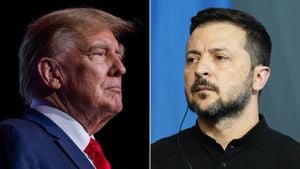Jarosław Kaczyński, the leader of the Law and Justice party (PiS), has firmly ruled out the possibility of Polish troops participating in peacekeeping missions on Ukrainian territory. This marks a significant shift from his earlier stance expressed back in March 2022 when he proposed NATO involvement to counter Russia’s aggression against Ukraine. Kaczyński stated, “I cannot envision such a situation,” emphasizing the impossibility of undertaking such operations against the clear will of the Polish people.
During a press conference, Kaczyński explained how the circumstances have dramatically changed over the last three years. "Today, we find ourselves in a situation where the Polish society certainly would not support such operations, and this is decisive," he remarked, highlighting how public sentiment has swayed since the onset of the war. His prior proposal of sending troops was rooted in the hope of deterring Russian advances and enhancing Ukraine's strategic military position at the time when no active warfare was occurring.
Kaczyński underscored the necessity of prioritizing Poland’s own national security, especially concerning hybrid threats at its border with Belarus. He noted, “We need the military for our own security needs,” which directly contrasts his previous assertion of needing forces on Ukrainian soil. This current emphasis aligns with the sentiments echoed by many political leaders who caution against overextending military commitments abroad.
At the core of Kaczyński’s current viewpoint lies the conviction about Polish democracy's status. He remarked, “If we do not live today in a democratic state, we still want to live in one,” indicating his beliefthat Poland must restore its democratic principles. This resonates with the party's narrative on upholding the national interest, especially amid perceived threats from both Russian expansionism and the intensifying domestic political climate.
Reflecting on the informal summit held recently in Paris, where leaders from various European nations met to discuss the situation in Ukraine, Kaczyński stated, “Such meetings serve little practical purpose.” His criticism seemed directed at European leaders’ ineffective approaches to security issues. “One needs to think clearly, arm themselves, and understand Russia will not abandon its ambitions,” he added, hinting at the perceived failure of the previous political elite to tackle the realities of the geopolitical threat.
The PiS leader’s perspective on not deploying troops and rejecting uncontested military engagements stems not only from public opinion but also from strategic military analysis. He established, “We cannot promise anyone any military formation, let alone large ones.” This sentence encapsulates his reluctance to engage Polish forces directly, stating the deployment of even small contingents is not feasible.
The conversation around military aid and involvement remains contentious within Polish society, with leaders like Donald Tusk also rebuffing the idea of sending Polish troops to Ukraine. Tusk's position strengthens the argument for cautious engagement, noting the risks associated with escalation amid the volatile situation.
Kaczyński's reiteration of the impossibility of military missions without public approval indicates a broader shift within Polish politics, as they navigate their relationship with NATO and European security frameworks. He persistently linked his military strategy to the urgency for democratic reinforcement back home, insisting on the need for public consensus on such significant national decisions.
The sentiments from this dialogue reflect the larger European narrative on military readiness and response. While the Polish society's reluctance showcases their desire for stability and consistency, it also raises questions about the region’s collective security efforts against rising threats. Mariusz Błaszczak, the former Minister of Defense and current PiS club leader, emphasized during the discussion, “Only the United States has the capability to deter aggressors,” reiteratly reflecting on the significance of global alliances and the unique position Poland must maintain within them.
This situation elucidates the challenges Poland faces as it balances public sentiment, military obligations, and its role within European and NATO frameworks. Kaczyński's reflections point to the contentions within Polish society over military intervention, marking the dialogues as pivotal as he noted, “The moment will likely extend for many years.” The evaluation of Poland’s military strategy continues to evolve, influenced by both social attitudes and the complex nature of geopolitical dynamics.
Through all this, Jarosław Kaczyński remains at the pivot of Polish political discourse—his shifts indicating not just personal convictions, but the wider societal concerns reflected across the nation. He concluded the conversation with renewed calls for strong, civic-backed decisions, illustrating his resolve to act within democratic boundaries, all the more relevant as European nations grapple with historical security challenges amid unprecedented military aggressions.



